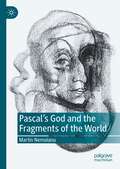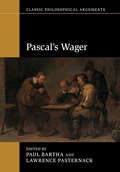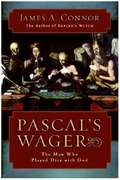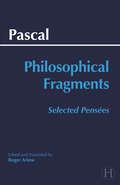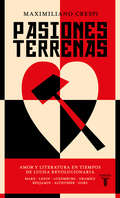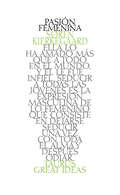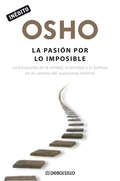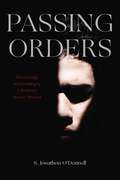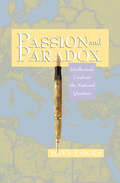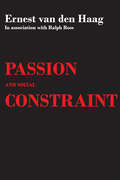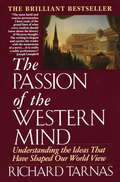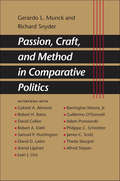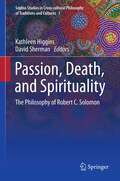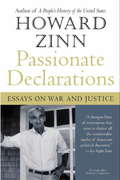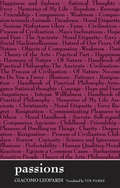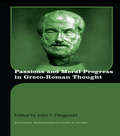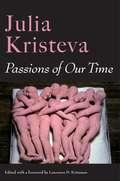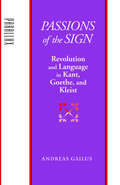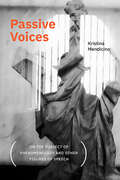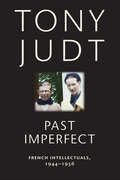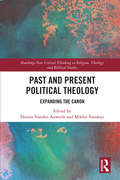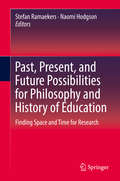- Table View
- List View
Pascal's God and the Fragments of the World
by Martin NemoianuIn Pascal's God and the Fragments of the World, Martin Nemoianu offers a new interpretation of the thought of Blaise Pascal, drawn from the Pensées and beyond. The book takes Pascal's central theme to be the distinction - Infini rien - between the transcendent God and the created world, which, without God, would be nothing. Nemoianu identifies the distinction in Pascal, articulates it, and works through the difficulties attending the distinction's disclosure. He then considers the implications of the distinction for the nature of nature and the nature of the human being, culminating in the ideal of martyrdom. The book closes with treatment of a closely related theme: the relation between human freedom and divine grace, in the context of the vexed question of Pascal's Jansenism.
Pascal's Wager (Classic Philosophical Arguments)
by Paul Bartha Lawrence PasternackIn his famous Wager, Blaise Pascal (1623–62) offers the reader an argument that it is rational to strive to believe in God. Philosophical debates about this classic argument have continued until our own times. This volume provides a comprehensive examination of Pascal's Wager, including its theological framework, its place in the history of philosophy, and its importance to contemporary decision theory. The volume starts with a valuable primer on infinity and decision theory for students and non-specialists. A sequence of chapters then examines topics including the Wager's underlying theology, its influence on later philosophical figures, and contemporary analyses of the Wager including Alan Hájek's challenge to its validity, the many gods objection, and the ethics of belief. The final five chapters explore various ways in which the Wager has inspired contemporary decision theory, including questions related to infinite utility, imprecise probabilities, and infinitesimals.
Pascal's Wager: The Man Who Played Dice with God
by James A. ConnorJames Connor explores both the intellectual giant whose theory of probability paved the way for modernity and the devout religious mystic who dared apply probability to faith.
Pascal: Selected Pensées (Hackett Classics)
by Roger Ariew Blaise PascalThis volume provides a selection of the most philosophically relevant passages from Pascal's Pensées in Roger Ariew's updated translations. Also included are a chronology of Pascal's life and times, a fascinating history of the text of the Pensées, and a selected bibliography.
Pasiones terrenas: Amor y literatura en tiempos de lucha revolucionaria
by Maximiliano CrespiAvatares amorosos y vida intelectual de los principales pensadores y agitadores de la izquierda mundial: Marx, Lenin, Luxemburg, Gramsci, Benjamin, Althusser, Gorz. Karl Marx solía decir que la filosofía y la historia, el pensamiento y la vida en común eran sus pasiones terrenas. Cómo en su caso, en la trama íntima de afectos, amores y desengaños de Lenin, Rosa Luxemburg, Walter Benjamin, Antonio Gramsci, Louis Althusser y André Gorz es posible rastrear y analizar sus ideas y acciones. Pasiones terrenas echa luz al corazón de estos pensadores esenciales y de ese prisma surgen, como rayos, lecturas inesperadas. Entregados al sueño persistente de la Revolución, esos espíritus encuentran en Maximiliano Crespi un demiurgo atento al pulso romántico y sexual, dulce y violento que los animaba. Con un abordaje originalísimo, este ensayo recupera, a partir de cartas, biografías, testimonios, memorias y documentos, el rol fundamental de las mujeres en la historia de las ideas de izquierda. Invisibilizadas hasta ahora, las relaciones íntimas con esposas, amantes y compañeras permiten la comprensión de las derivas teóricas y estimulan la reinterpretación de los derroteros intelectuales y existenciales de estos siete pensadores fundamentales del marxismo occidental.
Pasión femenina (Serie Great Ideas #38)
by Soren Kierkegaard40 grandes ideas que han cambiado el mundo. Kierkegaard, a quien a veces se ha tachado de misógino, tenía una concepción elevada del alma femenina. En estos textos, con un trasfondo de crítica social, el filósofo de la angustia nos brinda un fino análisis estético de la aflicción a través de diversas figuras femeninas (una Antígona moderna, María Beaumarchais, Doña Elvira y Margarita). A lo largo de la historia, algunos libros han cambiado el mundo. Han transformado la manera en que nos vemos a nosotros mismos y a los demás. Han inspirado el debate, la discordia, la guerra y la revolución. Han iluminado, indignado, provocado y consolado. Han enriquecido vidas, y también las han destruido. Taurus publica las obras de los grandes pensadores, pioneros, radicales y visionarios cuyas ideas sacudieron la civilización y nos impulsaron a ser quienes somos. La crítica ha dicho sobre la colección «Great Ideas»...«Un fenómeno editorial.»The Guardian
Pasión por lo imposible
by Osho OshoConsiderado un gurú del siglo XX, las enseñanzas de Osho (1931-1990) han sido recogidas a lo largo de una extensa obra. Este volumen es un compendio de todas las técnicas de Osho -debidamente sistematizadas- para potenciar el crecimiento personal y para hallar el camino que conduce a la verdad.
Pasquinade in E: Slaughtering Some Sacred Cows
by Gilles PaquetPasquinade is a satire or critical comment traditionally posted in a public place in ancient Rome; in particular, on the statue of Pasquino. Pasquinades in E is Gilles Paquet’s contribution to this waning tradition. These essays are exercises in critical thinking. They aim to exorcise a number of mental prisons about aspects of governing, and at denouncing pathologies in our ways of thinking and governing ourselves, by exposing their toxic nature. Silence on such matters connotes tacit agreement with toxic nonsense and, therefore, guilt by association for the ensuing mal-governance.
Passing Orders: Demonology and Sovereignty in American Spiritual Warfare
by S. Jonathon O'DonnellDemonization has increasingly become central to the global religious and political landscape. Passing Orders interrogates this centrality through an analysis of evangelical “spiritual warfare” demonologies in contemporary America. Situating spiritual warfare as part of broader frameworks of American exceptionalism, ethnonationalism, and empire management, author S. Jonathon O’Donnell exposes the theological foundations of the systems of queer- and transphobia, anti-blackness, Islamophobia, and settler colonialism that justify the dehumanizing practices of the current U.S. political order.O’Donnell argues that demonologies are not only tools of dehumanization but also ontological and biopolitical systems that create and maintain structures of sovereign power, or orthotaxies—models of the “right ordering” of space, time, and bodies that stratify humanity into hierarchies of being and nonbeing. Alternative orders are demonized as passing, framed as counterfeit, transgressive, and transient. Yet these orders refuse to simply pass on, instead giving strength to deviant desires that challenge the legitimacy of sovereign violence. Critically examining this challenge in the demonologies of three figures—Jezebel, the Islamic Antichrist, and Leviathan—Passing Orders re-imagines demons as a surprising source of political and social resistance, reflecting fragile and fractious communities bound by mutual passing and precarity into strategic coalitions of solidarity, subversion, and survival.
Passion To Oppose: John Anderson, philosopher
by Brian KennedyJohn Anderson was Australia's most important philosopher in the first half of this century. The young Scotsman held the chair of philosophy at the University of Sydney for thirty years until retirement in 1958. He developed his own distinctive system of realism and fathered a vigorous local school characterised by inquiry, independence and a deep commitment to philosophy as a way of life. He was a formidable public figure and fierce controversialist who outraged many of Sydney's conventionally minded. From an early Marxist phase, he opposed all forms of censorship and mind control. This first biography of Anderson is no hagiography, containing much new material about Anderson's Scottish past and his conflicted public and private life. His relations with students were complex; with women, they were decidedly problematic. In the aftermath of a pragmatic revolution that has swept our universities and colleges, Anderson;s uncompromising calls to unfettered inquiry, and the Socratic way of life are timely.
Passion and Paradox: Intellectuals Confront the National Question
by Joan CocksFrom Kosovo to Québec, Ireland to East Timor, nationalism has been a recurrent topic of intense debate. It has been condemned as a source of hatred and war, yet embraced for stimulating community feeling and collective freedom. Joan Cocks explores the power, danger, and allure of nationalism by examining its place in the thought of eight politically engaged intellectuals of the nineteenth and twentieth centuries: the antagonist of capital, Karl Marx; the critics of imperialism Rosa Luxemburg, Hannah Arendt, and Frantz Fanon; the liberal pluralist Isaiah Berlin; the neonationalist Tom Nairn, and the post-colonial writers, V. S. Naipaul and Edward Said. Cocks not only sheds new light on the complexities of nationalism but also reveals the tensions that have inspired and troubled intellectuals who have sought to lead lives between detached criticism and political passion. In lively, conversational prose, Cocks assesses their treatment of questions such as the mythology of national identity, the right to national self-determination, and the morality of nationalist violence. While ultimately critical of nationalism, she engages sympathetically even with its defenders. By illuminating the links that distinguished minds have drawn between thought and action on nationalism in politics, this stimulating work provides a rich foundation from which we ourselves might think or act more wisely when confronting a phenomenon that, in fundamental and perplexing ways, has shaped our world.
Passion and Social Constraint
by Ralph RossIn intellectual and academic circles, Ernest van den Haag was respected for his brilliant mind, his outspoken and often highly controversial assertions, and a very unacademic, sharp, biting style.
Passion in Theory: Conceptions of Freud and Lacan (Warwick Studies in European Philosophy)
by Robin FerrellPhilosophy had either ignored or attacked psychoanalysis: such responses are neither warranted nor helpful. One hundred years after its inception, isn't it time to find out what psychoanalysis has to offer us? In Passion in Theory Robyn Ferrell does just that, and returns with some surprising answers. Concentrating on the work of Freud and Lacan, Robyn Ferrell asks why their work had been so influential in European philosophy yet so marginal in the Anglo-American circles. Passion in Theory explores their conception of the relationship between mind and body, and how it provides a key to many current philosophical questions. Passion in Theory is designed for students and researchers in psychoanalysis, traditional and continental philosophy.
Passion of the Western Mind: Understanding the Ideas That Have Shaped Our World View
by Richard Tarnas"[This] magnificent critical survey, with its inherent respect for both the 'Westt's mainstream high culture' and the 'radically changing world' of the 1990s, offers a new breakthrough for lay and scholarly readers alike....Allows readers to grasp the big picture of Western culture for the first time."SAN FRANCISCO CHRONICLE. Here are the great minds of Western civilization and their pivotal ideas, from Plato to Hegel, from Augustine to Nietzsche, from Copernicus to Freud. Richard Tarnas performs the near-miracle of describing profound philosophical concepts simply but without simplifying them. Ten years in the making and already hailed as a classic, THE PASSION OF THE WESTERN MIND is truly a complete liberal education in a single volume.
Passion, Craft, and Method in Comparative Politics
by Richard Snyder Gerardo L. MunckIn the first collection of interviews with the most prominent scholars in comparative politics since World War II, Gerardo L. Munck and Richard Snyder trace key developments in the field during the twentieth century. Organized around a broad set of themes—intellectual formation and training; major works and ideas; the craft and tools of research; colleagues, collaborators, and students; and the past and future of comparative politics—these in-depth interviews offer unique and candid reflections that bring the research process to life and shed light on the human dimension of scholarship. Giving voice to scholars who practice their craft in different ways yet share a passion for knowledge about global politics, Passion, Craft, and Method in Comparative Politics offers a wealth of insights into contemporary debates about the state of knowledge in comparative politics and the future of the field.
Passion, Death, and Spirituality
by David Sherman Kathleen HigginsRobert C. Solomon, who died in 2007, was Professor of Philosophy and Quincy Lee Centennial Professor of Business at the University of Texas, USA. As the first book comprehensively to examine the breadth of Solomon's contribution to philosophy, this volume ranks as a vital addition to the literature. It includes a newly published transcript of Solomon's last talk, which responded to Arindam Chakrabarti on the concept of revenge, as well as the considered views of prominent figures in the numerous subfields in which Solomon worked. The content analyses his perspectives on the philosophy of emotion, virtue, business ethics, and religion, in addition to philosophical history, existentialism, and the many other topics that held this prolific thinker's attention. Solomon memorably defined philosophy itself as 'the thoughtful love of life', and despite the diversity of his output, he was most drawn by central questions about the meaning of life, the essential role that emotions play in finding that meaning, and the human imperative to seek 'emotional integrity', in which one's thoughts, emotions, and actions all contribute to a coherent narrative. The essays included here draw attention to the interconnections between the issues Solomon addressed, and evince the manner in which he embodied that integrity, living a life at one with his philosophy. They emphasize the central themes of passion, ethics, and spirituality, which threaded through his work, and the way these ideas informed his views on how we should approach grief and death. The multiplicity of topics alone make this keystone work an enlightening read for a full spectrum of students of philosophy, providing much to ponder and recounting a subtle and shining example of the emotional integrity Solomon worked so hard to define.
Passionate Declarations: Essays on War and Justice
by Howard ZinnFrom the bestselling author of A People's History of the United States comes this selection of passionate, honest, and piercing essays looking at American political ideology. Howard Zinn brings to Passionate Declarations the same astringent style and provocative point of view that led more than a million people to buy his book A People's History of the United States. He directs his critique here to what he calls "American orthodoxies" -- that set of beliefs guardians of our culture consider sacrosanct: justifications for war, cynicism about human nature and violence, pride in our economic system, certainty of our freedom of speech, romanticization of representative government, confidence in our system of justice. Those orthodoxies, he believes, have a chilling effect on our capacity to think independently and to become active citizens in the long struggle for peace and justice.
Passions
by Tim Parks Giacomo LeopardiRevenge--Revenge is so sweet one often wishes to be insulted so as to be able to take revenge, and I don't mean just by an old enemy, but anyone, or even (especially when in a really bad mood) by a friend.--from Passions The extraordinary quality of Giacomo Leopardi's writing and the innovative nature of his thought were never fully recognized in his lifetime. Zibaldone, his 4,500-page intellectual diary--a vast collection of thoughts on philosophy, civilization, literary criticism, linguistics, humankind and its vanities, and other varied topics--remained unpublished until more than a half-century after his death. But shortly before he died, Leopardi began to organize a small, thematic collection of his writings in an attempt to give structure and system to his philosophical musings. Now freshly translated into English by master translator, novelist, and critic Tim Parks, Leopardi's Passions presents 164 entries reflecting the full breadth of human passion. The volume offers a fascinating introduction to Leopardi's arguments and insights, as well as a glimpse of the concerns of thinkers to come, among them Nietzsche, Dostoyevsky, Wittgenstein, Gadda, and Beckett.
Passions and Moral Progress in Greco-Roman Thought (Routledge Monographs in Classical Studies)
by John T. FitzgeraldThis book contains a collection of 13 essays from leading scholars on the relationship between passionate emotions and moral advancement in Greek and Roman thought. Recognising that emotions played a key role in whether individuals lived happily, ancient philosophers extensively discussed the nature of "the passions", showing how those who managed their emotions properly would lead better, more moral lives. The contributions are preceded by an introdution to the subject by John Fitzgerald. Writers discussed include the Cynics, the Neopythagorians, Aristotle and Ovid; the discussion encompasses philosophy, literature and religion.
Passions of Our Time (European Perspectives: A Series In Social Thought And Cultural Criticism)
by Julia KristevaJulia Kristeva is a true polymath, an intellectual of astonishingly wide range whose erudition and insight have been brought to bear on psychoanalysis, literary criticism, gender and sex, and cultural critique. Passions of Our Time showcases recent essays of Kristeva’s that demonstrate the scope of her capacious intellect, her gifts as a stylist, and the profound contribution of her thought to the challenges of the present.The collection begins with а vivid recollection of celebrating, as a child in Bulgaria, Alphabet Day, the holiday honoring the Cyrillic letters, which proceeds outward into a contemplation of the writer as translator. Kristeva considers literature with Barthes, freedom through Rousseau, Teresa of Avila and mystical experience, Simone de Beauvoir’s dream life, and Antigone and the psychic life of women. A group of essays drawing on her psychoanalytic work delve into Freud, Lacan, maternal eroticism, and the continued importance of psychoanalysis today. In a series of striking investigations, she thinks through disability and normativity, monotheism and secularization, the need to believe and the desire to know. Calling for the courage to renew and reinvent humanism, she outlines the principles of a stance founded on the importance of respecting human life. Finally, Kristeva discusses French culture and diversity, rethinking universalism and interrogating the potential for Islam and psychoanalysis to meet, and pays homage to Beauvoir by rephrasing her dictum into the provocative “One is born woman, but I become one.”
Passions of the Sign: Revolution and Language in Kant, Goethe, and Kleist (Parallax: Re-visions of Culture and Society)
by Andreas GailusPassions of the Sign traces the impact of the French Revolution on Enlightenment thought in Germany as evidenced in the work of three major figures around the turn of the nineteenth century: Immanuel Kant, Johann Wolfgang von Goethe, and Heinrich von Kleist. Andreas Gailus examines a largely overlooked strand in the philosophical and literary reception of the French Revolution, one which finds in the historical occurrence of revolution the expression of a fundamental mechanism of political, conceptual, and aesthetic practice. With a close reading of a critical essay by Kleist, an in-depth discussion of Kant's philosophical writing, and new readings of the novella form as employed by both Goethe and Kleist, Gailus demonstrates how these writers set forth an energetic model of language and subjectivity whose unstable nature reverberates within the very foundations of society. Unfolding in the medium of energetic signs, human activity is shown to be subject to the counter-symbolic force that lies within and beyond it. History is subject to contingency and is understood not as a progressive narrative but as an expanse of revolutionary possibilities; language is subject to the extra-linguistic context of utterance and is conceived primarily not in semantic but in pragmatic terms; and theindividual is subject to impersonal affect and is figured not as the locus of self-determination but as the site of passions that exceed the self and its pleasure principle.At once a historical and a conceptual study, this volume moves between literature and philosophy, and between textual analysis and theoretical speculation, engaging with recent discussions on the status of sovereignty, the significance of performative language in politics and art, and the presence of the impersonal, even inhuman, within the economy of the self.
Passive Voices: On The Subject Of Phenomenology And Other Figures Of Speech) (SUNY series, Intersections: Philosophy and Critical Theory)
by Kristina MendicinoAt least since Aristotle's Peri hermeneias, there has been talk of the pathos of language, of language as "symbols of the affections in the soul." The way these affections are registered, however, suggests that they are themselves structured like language. For Aristotle and others, language is suffered before any sense can be voiced. The pathos of language thus becomes a question of how language affects the subject of speech and, in the last analysis, of how language could respond to these questions of language. Passive Voices (On the Subject of Phenomenology and Other Figures of Speech) approaches these questions, first, through readings of Augustine's investigations into language and mind and Edmund Husserl's descriptions of passive synthesis. It then traces the further resonance of Augustine's and Husserl's interventions in selected literary experiments by Georges Bataille, Franz Kafka, and Maurice Blanchot that recall Husserl and Augustine while exceeding the restrictive fictions of phenomenological "science." In drawing out the echoes that emerge across confessional, philosophical, and fictional writings, this book exposes the ways in which speech occurs in the passive voice and affects any claim to experience.
Past Imperfect: French Intellectuals, 1944-1956
by Tony JudtA &“marvelously readable&” critique of Sartre, Camus, de Beauvoir, and other French postwar intellectuals that &“consistently entertains and provokes&” (The Washington Post). The uniquely prominent role of French intellectuals in European cultural and political life following World War II is the focus of this book by the acclaimed author of Postwar: A History of Europe Since 1945. Tony Judt analyzes this intellectual community&’s most divisive conflicts: how to respond to the promise and the betrayal of Communism and how to sustain a commitment to radical ideals when confronting the hypocrisy in Stalin&’s Soviet Union, in the new Eastern European Communist states, and in France itself. Judt shows why this was an all-consuming moral dilemma to a generation of French men and women, how their responses were conditioned by war and occupation, and how postwar political choices have come to sit uneasily on the conscience of later generations of French intellectuals. Judt&’s analysis extends beyond the writings of fashionable &“existentialist&” personalities such as Jean-Paul Sartre, Albert Camus, and Simone de Beauvoir to include a wide intellectual community of Catholic philosophers, non-aligned journalists, literary critics and poets, Communist and non-Communist alike—and asserts that what he calls the &“moral irresponsibility&” of those years damaged France&’s cultural standing, and reflected the nation&’s larger difficulty in confronting its own ambivalent past. &“A forthright and uncommonly damning study of those intellectually volatile years . . . indicts these intellectuals for their inhumanity in failing to test their political thought against political reality.&” —The New York Times Book Review &“Brilliant . . . splendidly written.&” —Foreign Affairs
Past and Present Political Theology: Expanding the Canon (Routledge New Critical Thinking in Religion, Theology and Biblical Studies)
by Dennis Vanden Auweele Miklos VassányiThis book demonstrates how discussions of Political Theology have been a constant feature throughout philosophical modernity and that they continue to impact contemporary political debates. By tracing the historical roots and detailing the contemporary outworking of Political Theology in Europe, it contends that this growing field requires a broader "canon" in order for it to mature. Political Theology is shown here to be about the diversity of relationships between religious beliefs and political orientations. First engaging with historical debates, chapters re-examine the relationship between personal conviction and societal orientation on such topics as the will to believe, evil, individualism, the relationship between church and state, and the relationship between belief and natural science. The volume then establishes the relevance of these debates for the present day. As such, it invites engagement on the back and forth between religion and politics in a liberal democracy and a communist state, on how communitarianism relates to religious language, on the diversity of Christian and Jewish political theology, and the politics of toleration. By broadening out the field of Political Theology this book offers the reader a more nuanced understanding of its sustained influence on public life. As such it will be of interest to academics working in Political Theology, but also Theology, Philosophy and Political Science more generally.
Past, Present, and Future Possibilities for Philosophy and History of Education: Finding Space And Time For Research
by Naomi Hodgson Stefan RamaekersOn the occasion of the retirement of Paul Smeyers, this book considers the state and status of the philosophy and history of education today. Over the last 20 years, the conditions in which research takes place have changed considerably. They have done so in ways that are often less than favourable to disciplines such as history and philosophy of education, and the space and time for the practices that constitute these disciplines – of reading, of writing, of collegiality – is increasingly under pressure. During this time, the Research Community on the History and Philosophy of Educational Research has convened annually to bring its critical lenses to bear on these emergent conditions and to suggest ways that educational research might, or ought to, be done otherwise. As co-founder and co-convenor of the Research Community, this volume explores and recounts Paul Smeyers' development of Wittgensteinian scholarship and its legacy in education, his formative role in the development of philosophy of education as an international field, his many international collaborations, the “useless” educational-philosophical deepening of concepts, and the wider educational-philosophical import of this. This gives rise to consideration of the failure of these fields to halt the changes in the governance and status of the university that threatens them, and those practices that remain and that are emerging in academia that we wish to protect, to pass on to the next generation of researchers in these fields.
